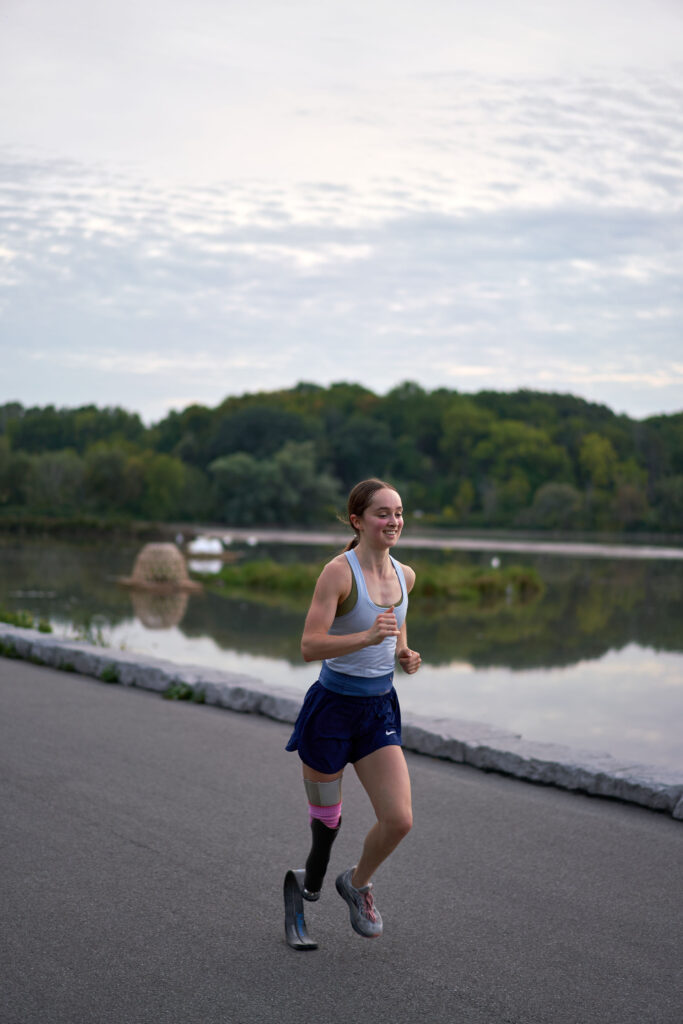I Am Not My illness is a series highlighting people living with complex disorders and their self-identity, passions and interests.
Sarah Gillies, as told to Nicole Naimer
As a child, I asked Santa for my right leg. My parents needed to explain to me the limits of Santa’s capabilities.
I was born with fibular hemimelia, accounting for my missing fibula and a short, bent tibia.
My parents were given two options. The first was leg lengthening that would involve procedures breaking my tibia on a yearly basis to be stretched out to grow longer. I would, maybe, be able to walk with assistance by age 7.
The second option was amputation. My parents live a very active lifestyle, and they thought amputation was the best option for me and my mobility.
My leg was amputated when I was seven months old. I started walking with a prosthetic at the same time most other toddlers started walking.
When I was in elementary school, I didn’t want to be different. I didn’t want to be disabled. I didn’t want to be an amputee.
I didn’t like it when people looked at my prosthetic or asked questions. It was a reminder that I was different, and all I wanted was to blend in.
I didn’t know anyone else like me.
There were some physical challenges growing up. Each year, I would grow out of my prosthetic, enduring pressure sores, rashes and blisters in the process. My prosthetic broke multiple times, and I needed to use crutches. But I had a great prosthetist who always helped me in a timely manner.
The biggest challenge growing up were the mental hurdles, more so than anything physical.
My parents taught me to ski when I was 2. However, from a young age I thought I couldn’t keep up with the able-bodied kids. I didn’t want to compete, and I didn’t want to play team sports.
At 8 years old, my parents took me to see the Paralympics in Vancouver, where I watched Para Alpine Skiing live. I was surrounded by people with physical disabilities; the athletes had disabilities, and some spectators did, too. That was the first time I was around people like me. It’s when I was initially introduced to parasport; I didn’t even know it was an option before.
After seeing the Paralympics, I tried para-alpine ski racing myself. I met other para-athletes who were proud of their disabilities, which seemed so foreign to me. My eyes were opened to the possibility that I could share my disability openly and proudly. I noticed a mental shift; a new-found self-confidence after meeting the other para-athletes and trying parasport.
I went on to do able-bodied ski racing because there’s a lack of para-ski racing available in my area. I thought I wasn’t good enough to compete with able-bodied ski racers – but then I did it. After all, this was never a physical battle but a mental one. My confidence continued to grow.
My disability has given me a different appreciation for sport. Sport is amazing for so many reasons: health, independence and determination. But for me, it created a huge turning point – from not wanting to be disabled to loving myself as an amputee.
Growing up, I didn’t wear shorts because they exposed my prosthetic. I wanted to keep my disability hidden. Because I wanted to change my body so badly, it was hard to love myself. In high school, I realized if I’m going to be an amputee for my whole life, that’s a long time to spend hating something that I can’t change.
I went from not wanting to be an amputee to really appreciating that I am an amputee. I take pride in the things that being an amputee has allowed me to do – travelled the world on the national para-ski racing team and public speaking.
This May, I am participating in a 150-kilometre challenge for The Million Reasons Run, raising money for children’s hospitals across Canada. As of May 15, I’ve run 105 kilometres and I’ve raised almost $8,000.
My journey growing up as an amputee has shown me how pivotal health-care workers can be in a child’s life. That’s what empowered me to sign up for this run. It’s also why I hope to be a pediatrician one day.
I am proud of how far I’ve come. If I woke up tomorrow and I had two legs, I would be devastated. I think my life is better with one leg.
Top photo by Jack Gillies
Running photo by Andre Morgan of DRE.RUN



The comments section is closed.
Well done Nicole.